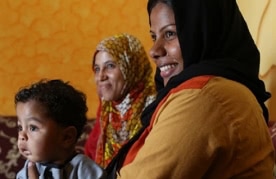Quality child-care services for workers in the informal economy
 Women workers in the informal economy must earn income. Child-care responsibilities may not keep them out of the labour force, but do funnel women into low paid, vulnerable employment as own account workers or contributing family workers.
Women workers in the informal economy must earn income. Child-care responsibilities may not keep them out of the labour force, but do funnel women into low paid, vulnerable employment as own account workers or contributing family workers.
Child-care responsibilities lead to a significant loss of earnings in the short-term and contribute to women’s low incomes across their life cycle – reflected in higher poverty rates and limited access to work-related pensions among older women.
Child-care provision and parental leave are proven to have a positive impact on women’s labour force participation and are essential to creating decent work opportunities for women. These policies are necessary for redistributing, with the State, the unpaid care work done primarily by women.
This is the first of three policy briefs. WIEGO and ILO highlight both the urgent child-care needs of women workers in the informal economy and the demands for decent working conditions for child-care workers and domestic workers – most of whom are women working in the informal economy.
See also:
- Policy Brief 2: Labour and human rights frameworks promoting childcare for all workers
- Policy Brief 3: Extending childcare services to workers in the informal economy: Policy lessons from country experiences
Also available in:
View list of all: Research Reports

